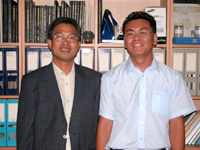
A CNU venture capital firm, founded by students, has succeeded in developing a biopesticide/fertilizer mixture, 멌hitin Compost�. After an intensive ten-year research, Prof. Kim Kil-yong (Major of Biological and Environmental Chemistry, Department of Applied Bioscience & Biotechnology, College of Agriculture & Life Sciences) has succeeded in developing the new biopesticide/fertilizer mixture. Prof. Kim and his students founded a campus venture capital firm named 멖euksarang (Earth Love) Co. (CEO: Chai Dong-hyun, Doctor뭩 Degree Course Student).� Based on Kim뭩 research results, they repeated laboratory and farming experiments for three years and finally succeeded in commercializing the invention.
Prof. Kim and the venture firm 멖euksarang� conducted experiments on Mr. Lim뭩 farm at Soobuk-myon in Damyang-gun County and pepper farms at Doam-myon in Hwasoon. The results of field experiments proved this newly-developed mixture is quite effective in increasing agricultural production and preventing damage caused by repeated cultivation as well.
The effective use of biological pesticides, called biopesticides, can promote their adoption in agriculture. Biopesticides are certain types of pesticides derived from such natural materials as animals, plants, bacteria, and certain minerals. They pose fewer health and safety concerns than conventional, chemical pesticides. Certain strains of the soil bacteria Pseudomonas fluorescens have anti-fungal activity that inhibits some plant pathogens. P. fluorescens and other Pseudomonas and Xanthomonas species can increase plant growth in several ways. They may produce a compound that inhibits the growth of pathogens or reduces invasion of the plant by a pathogen. They may also produce compounds (growth factors) that directly increase plant growth. These plant growth-enhancing bacteria occur naturally in soils, but not always in high enough numbers to have a dramatic effect. In the future, farmers may be able to inoculate seeds with anti-fungal bacteria, such as P. fluorescens, to ensure that the bacteria reduce pathogens around the seed and root of the crop.
밄acteria are tiny, one-celled organisms � generally 4/100,000 of an inch wide (1 탆) and somewhat longer in length. What bacteria lack in size, they make up in numbers. A teaspoon of productive soil generally contains between 100 million and 1 billion bacteria. The newly-developed compost with high percentage of microorganisms can be raised in farms with ease and it will be a big step toward increasing crop productivity,� Prof. Kim said.
멖euksarang� signed with a manufacturing company for the commercialization of the new invented compost. The company prepaid 85 million won for the contract in advance, which is a quite exceptional case.
Chai Dong-hyun of 멖euksarang� said, 밅ompared with the microorganisms contained in conventional pesticides, this new mixture can make the microorganisms survive over two years. The price is much lower to 1/500.�